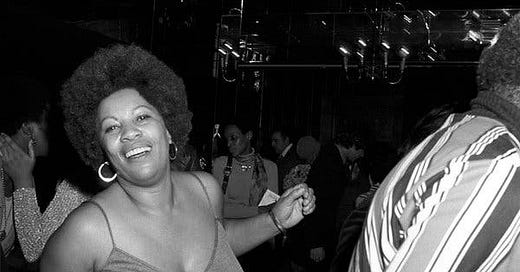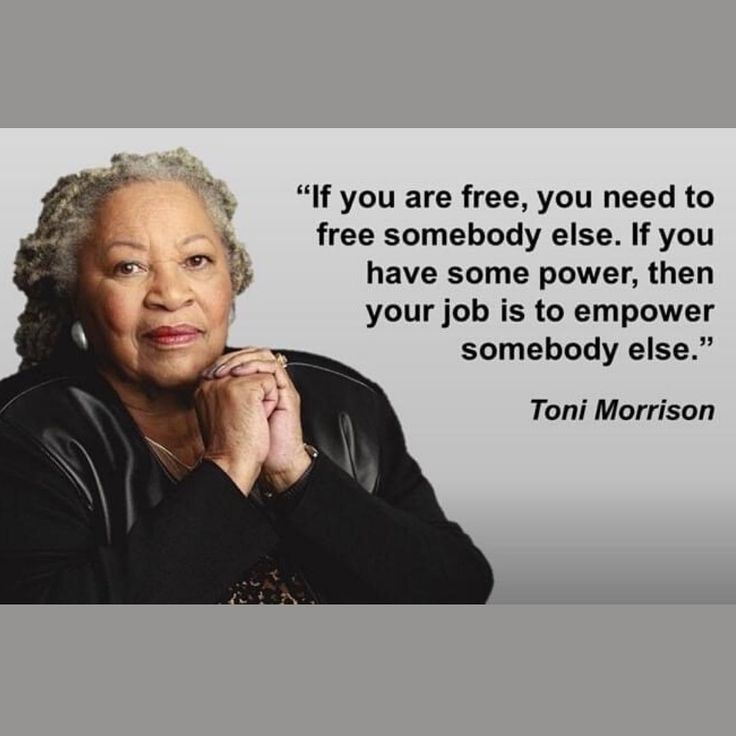Beloved Book Bans
Algorithms are delivering more smut to underage students than librarians (or Toni Morrison for that matter)
I’ve read Toni Morrison’s novel Beloved umpteenth times.
It’s a literary masterpiece and one of my favorite novels. Despite its accolades and the author’s numerous prizes, the book perennially finds itself on many banned list (so you know it’s gotta be a great read).
I don’t agree with the banning of books, but I don’t get too riled up when I hear of yet another stupid crusade to keep some other great piece of literature out of the hands of young people. After all, many book bans often have the opposite of their intended effects by increasing the visibility and sales of their targets.
In respect to Beloved I can’t imagine why any school teacher would ever actually assign Beloved in the first place (AP classes notwithstanding). The book is a difficult piece of literature that requires a level of sophistication and maturity that most students don’t yet possess. Assigning Morrison to children is like asking a 10-year-old to savor the cherry notes of a 2016 Montalcino Brunello (yes, I was just in Italy and can’t stop referencing it).
However, after reading press reports on the current moral panic sweeping the nation’s school board meetings, it sounds as if Morrison’s books (Beloved, The Bluest Eye, Song of Solomon) are not necessarily being removed from class syllabi so much as from the shelves of high school libraries.
The American Library Association listed her book The Bluest Eye as one of the most challenged books of 2022 along with a whole bunch of LGBTQ publications including the not-so-subtle This Book is Gay by Juno Dawson.
I wonder, however, how many times any of Morrison’s books are actually checked out by high schoolers in the first place? Not that such a statistic would really matter. It is just that the actual number of hands that the bans are keeping the books out of, I would guess, are really, really small.
In reality Morrison’s words and stories are more than available at local city and county libraries, bookstores, websites, and via memes on social media.
Plus, the vulgarities and obscenities found in any novel are nothing compared to the whoring that goes on TikTok and other social media. My personal search page on Instagram is algorithmically populated by street brawls caught on camera as well as men bouncing their penises in variety of outerwear fabrics (so hot!).
I suspect algorithms are delivering more smut to teenagers than librarians could ever imagine.
For this reason I can’t seem to get worked up over, say, Amanda Gorman’s Inauguration Poem “The Hill We Climb” being restricted at a K-8th grade school in Miami Dade County. Gorman said she was “gutted” by the restriction.
Really? She has 3.8 million followers on Instagram. And the “banning” of her poem, prompted by a single parent’s complaint, generated tons of free press for her and her work. Getting banned actually seems like a great proposition for a writer of her stature!
BIBLIOPHILIA GONE WILD
I binged all of Morrison’s novels the year after I quit teaching.
I took the instruction the author offered in her Nobel Prize speech that language be the measure of our lives, literally. I used her novels to measure out the length of my post-employment year. I worked my way back to the anniversary of my last day of teaching by reading each of her eleven novels as a way to luxuriate in my newfound freedom and to do with my time what I wanted and not what I was required to do by a boss or administrator (Beloved, Sula, and Paradise were my favorites, btw).
Reading through one’s book-bucket list is a bibliophile’s form of retirement world travel.
I’ve been rereading Beloved since my UCLA undergraduate years. I receive something new and surprising from the novel every time I return to it. A revelation, usually rooted more in the reader’s gained maturity than the work itself, always awaits when rereading a book.
This last time around, I realized I had never paid much attention to the role of teachers in the novel. Now, at the endpoint of my first career, the teacher characters in the story stood out in high relief.
The slave owner character in Beloved is named Schoolteacher. He is a loathsome boss who reigns terror onto the Sweet Home plantation and its slaves through dehumanizing violence. The scene involving Schoolteacher’s demonstration of instructional methods to his nephews includes a lesson on categorizing the human and animal characteristics of the main slave character, Sethe.
This clinical, anthropological, academic, and cruel version of what a teacher can be is later balanced out in the novel by another pivotal (and actual) schoolteacher character I had completely forgotten about, Ms. Lady Jones.
She is the schoolhouse teacher that Sethe’s daughter Denver returns to after the child’s long absence from formal education. When Denver and her mom become tormented by a spooky entity living in their house, the person Denver seeks help from is her former schoolteacher, Ms. Lady Jones. It’s Lady Jones who then gathers a community of women together to help Sethe and Denver beat back the troublesome haunt terrorizing their lives.
Although it was Schoolteacher who brought wrath upon the family it was a school teacher who ultimately delivered the resources of the community unto them as their salvation.
Morrison is a master at playing these semantic tricks on her readers.
Masters
Teacher in Spanish is maestro and maestra. I have been Maestro Villegas for a very long time to my Latinx students and their parents. The romance language curiously uses the same word for master, as in someone who has mastered a skill or a person who owns slaves, as it does for teachers. A slave master and teachers are all linguistically, conceptually related in Spanish. Master. Maestro. Maestro.
In my career I might have to admit I’ve unconsciously vacillated between being two versions of a teacher— the mean, clinical taskmaster as well as the empathetic caregiver.
There is a cruelty I administered involuntarily whenever I gave in to the idea that my employers were going to use the learning of my students, as measured by tests, to judge whether I was worthy of a paycheck or a “meets expectations” rating on my evaluations. The frustration I had over my students’ academic deficits as well as the exacerbating poverty and trauma experienced by them often mutated me into a master—that impatient, unempathetic, aggravated commander seeking nothing but the profit of high test scores and obedient behavior from my charges.
Then there were the times when I gave into being a kind and caring provider, shrugging off the complications and repercussions involved in letting kids learn at their own pace, allowing children to play freely, or making a priority of how to deliver resources to a family in need—the free clothes, the extra time, the extra lessons, the extra attention like when I visited Leonardo at the hospital after a particularly extreme asthma attack he suffered, or attended Anthony’s father’s funeral, or wrote letters on behalf of undocumented parents, advocating for the students and their families when no one would see or care if I did.
When the scales started to tip more and more often into me being the baser version of an educator, I made a necessary exit. I had to for my own well-being. However, too many educators are trapped in an economic quandary of continuing in a job that has become routine, going through the motions for a vital paycheck. They are hollowed out by exhaustion, too tired and too scared to fight back even when they realize they’re nothing more than an expendable employee sent in to train their own replacements.
Although I don’t know if I’d recommend a high schooler pick up Beloved, every educator should. Pay attention to how Morrison expertly plays with the idea of schools and schoolteachers.






Always a great read from your Maestria Mind.